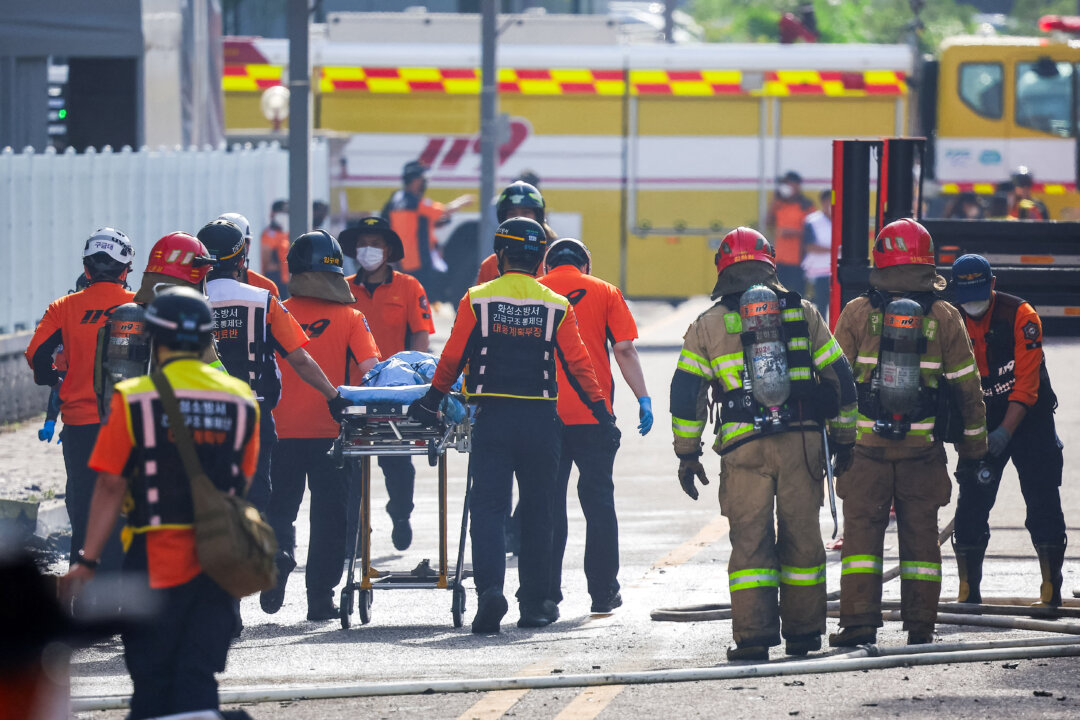Battery fires are under the microscope in South Korea after a series of blazes, including one in June at a lithium battery plant that left 23 people dead.
The head of a lithium battery firm was arrested on Aug. 28 over alleged violations of industrial safety laws after a factory fire killed 23 people in South Korea.
Suwon District Court approved an arrest warrant for Park Soon-kwan, CEO of Aricell, over his role in the fatal blaze in June, a court spokesperson confirmed.
The court also issued a warrant for Park’s son, who works at the company as an executive, the spokesperson added.
Seoul’s Ministry of Employment and Labor said Park had been arrested and charged with “causing the deaths of 23 people” by employing contract workers who didn’t have the requisite qualifications to handle seriously flammable materials.
Park’s arrest is the first time that a CEO has been held responsible under legislation introduced in 2022 to penalize company management for industrial accidents.
The Serious Disasters Punishment Act carries punishment of up to a year in prison or a one billion won ($835,000) fine for business owners and managers involved in accidents that cause death or serious injury.
Last week, police said the fire at the factory in Hwaseong, about 28 miles south of the capital city of Seoul, broke out as the company raced to meet a deadline without taking steps to address indications of serious quality failures.
Entering the court for a hearing on Aug. 28, Park didn’t respond to reporters’ questions, but Korean TV footage showed him saying “I’m sorry.”
Authorities investigating the fire released a report last week saying a rush to meet a supply deadline and a lack of action to address signs of dangerous quality defects in batteries led to the fire.
The fire originated on the second floor of the factory, where more than 35,000 lithium batteries were stored. Many of those who died were Chinese immigrant workers, according to local media.
After the fire, Park issued an apology, saying, “We are deeply saddened by the loss of life and would like to express our deepest condolences and apologies to the bereaved families.”
“We take great responsibility and will sincerely provide support to the deceased and their families in every way possible,” he added.
Established in 2020, Aricell makes lithium batteries for sensors and radio communication devices.
The company is not listed on South Korea’s stock market but is majority-owned by S-Connect, according to Aricell regulatory filing
It has 48 employees, according to its latest regulatory filing and its Linkedin profile.
Battery fires are under the microscope in South Korea after a series of blazes caused by malfunctioning cells.
Earlier this month, Seoul held an emergency meeting to discuss safety concerns over electric vehicles (EVs), in the wake of an inferno in an underground parking garage caused by an EV catching fire.
The fire in a parking garage beneath an apartment block in the city of Incheon on Aug. 1 took eight hours to extinguish. Dozens of residents in the apartment block were evacuated, and 87 vehicles burned, while hundreds more had smoke damage.
The fire started for unknown reasons in a Mercedes-Benz EV.
Experts say EVs burn differently from cars with internal combustion engines.
In January, Matt Humby, a senior technical consultant at fire extinguisher manufacturer Firechief Global, told The Epoch Times that fires in EVs “may last longer and be more liable to re-ignite.”
He said there were “significant differences in the best practices for fire detection and firefighting for electric vehicles.”
Reuters contributed to this report.

